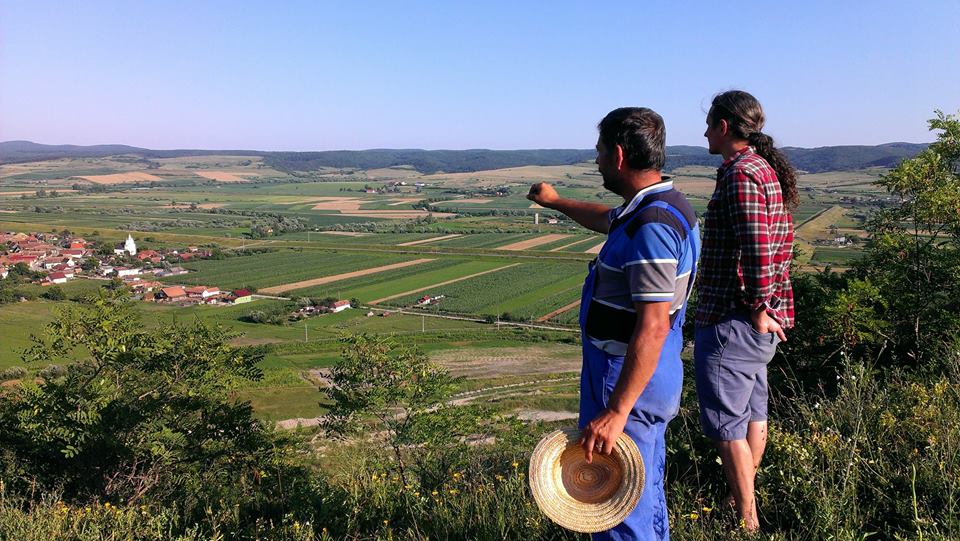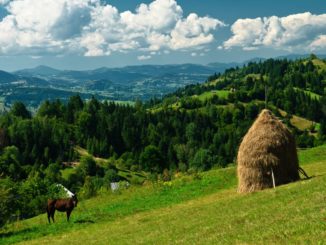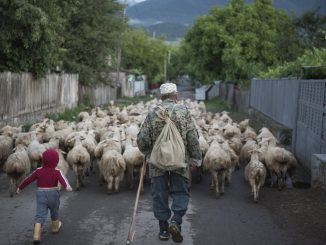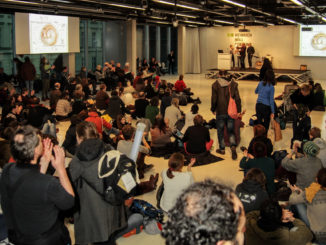
Legal action committees, the use of international legal tools, successful campaigns against huge corporate interests, land occupations, public land initiatives, alliances, land trusts and CSAs all feature six chapter report.
“Your Land, My Land, Our Land: Grassroots Strategies to Preserve Farmland and Access to Land for Peasant Farming and Agroecology” is a collection of case studies, practical tips legal tools and more, “to facilitate access to land for peasant and agroecological farmers, shepherds and mobile pastoralists, small-scale food producers, local residents, consumers, and environmentally-minded people and organisations, highlighting their crucial roles in building a more sustainable and fairer system” according to Nyéléni Europe.
Read Your_Land_My_Land_Our_Land in English
Land access is an ongoing issue for people who want to farm, and for people who want to maintain or grow their their farming endeavours. From a slow rate of inter-generational transfer, an aging farming population, to ongoing issues of farm consolidation and land grab, land access has been to the forefront of efforts to make the agri-food system more resilient and fair.
The context is heightened with both COVID-19 and the EU Commission’s Farm to Fork strategy, which sets ambitious targets for farming – targets which an agroecological approach could help Europe meet.
Indeed, the Biodiversity Strategy cites “at least 25% of agricultural land is under organic farming management, and the uptake of agro-ecological practices is significantly increased.”
While little reference is made to issues of land access, land concentration or inter generational land transfer in these strategies, a new tool – from the ground up – may help.
Your Land, My Land, Our Land points to significant problems such as the extreme reduction of the number of farmers; October 2019 study for European Parliament), land concentration; aging farming populations (citing this briefing) and the slow rate of intergenerational transfer as major ongoing issues in farming (For more on these issues, see our curated set of links below this article).
However its primary purpose is to takes a number of proactive approaches to dealing with these problems, offering guidelines and citing examples from all over Europe: political, legal, and a range of community action approaches feature in the report.
These range from the a policy level land collaboration between the Brussels authorities and community land trust Terre-en-vue in the Belgian capital, to successful campaigns such as the Rosa Montana movement which blocked Europe’s largest open cast gold mine in Romania, an to land occupations in Andalusia:
The Andalusian union SOC (Sindicato Obreros del Campo) show that the land occupation movement is alive and well in Europe. SOC-SAT use a strategy of land occupations to illustrate their broader goals of developing agroecology and agrarian reform. They have a history of successful occupations, putting land into productive use for the benefit of families of landless workers and demonstrating agroecological alternatives to dominant industrial production systems. SOC explain in their interview their ideology and the logic of occupying and productively using land in Andalusia. This is followed by a concrete example of how these strategies can bring about success, with the emblematic case of El Ejido.
According to Nyéléni Europe “each experience is useful as both a standalone tool, as well as in conjunction with the other tips, tools and tried-and-tested methods included. The handbook also provides insight into the land policies, both national policies and international instruments, which can be used to preserve farmland and grant access to it to peasants, new farmers, landless workers, local communities and for sustainable farming methods.”
The organisation adds: “the contributors hope that collectives involved in local struggles, land activist groups, peasant and small-scale farmers’ organisations, future farmers, organisations working on food sovereignty and just food systems, consumers’ groups, environmental groups and other food and environmental organisations will be able to use the handbook to support their work.”
The release of the handbook will also be followed by a series of webinars focusing on specific handbook cases and other key land issues. A full presentation of the publication will take place on 16 June at 2 pm CET (register here), followed by more thematic sessions that focus on key cases throughout the second half of 2020.
“Your Land, My Land, Our Land” is coordinated by European Coordination Via Campesina (ECVC), Terre de Liens, URGENCI, Eco Ruralis, the International Federation of Organic Agriculture Movements (IFOAM-EU), Real Farming Trust (RFT) and Transnational Institute (TNI). The report is also available in Spanish ES: Tu tierra, mi tierra, nuestra tierra and French FR: Des terres en commun.
More
How Do Some EU Countries Get More Young People Involved in Farming?
Rural Dialogues | Intergenerational Collaboration in the Vineyards of Southern France
Where Soya has Scale – Ukraine, Big Ag and Land Concentration
Quietness & Adaptability – Ukrainian Peasants’ Responses to Land Grabbing & Agribusiness Expansion
Land grabbing – a warning for Europe & a threat to family farming




